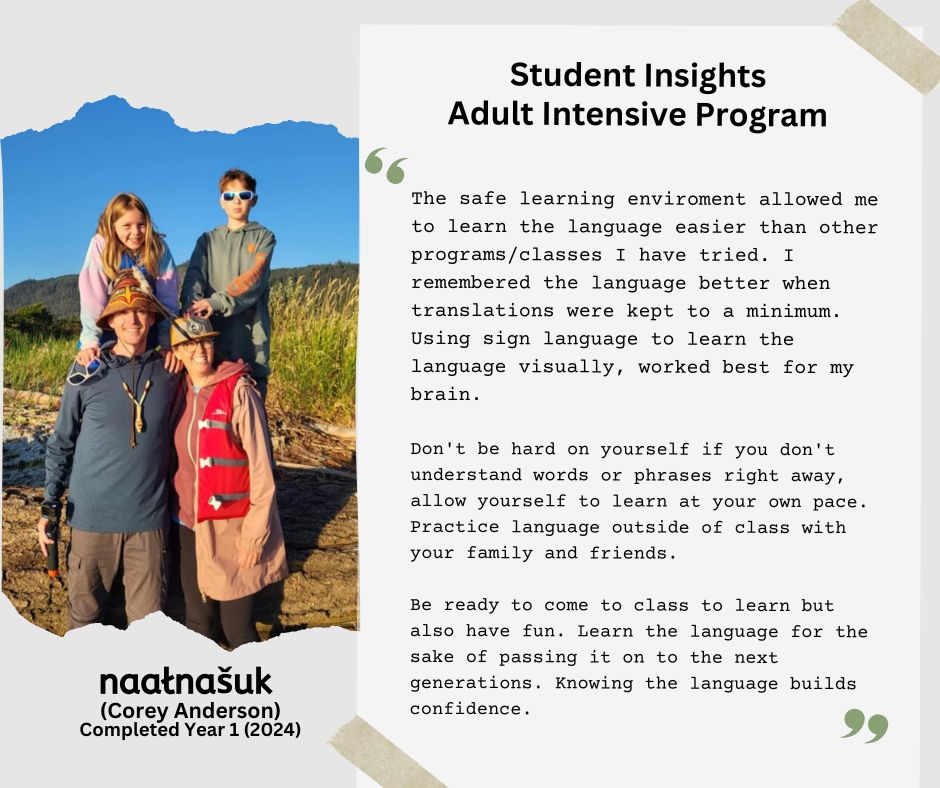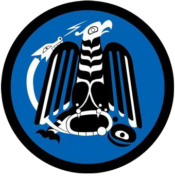Adult Intensive Program
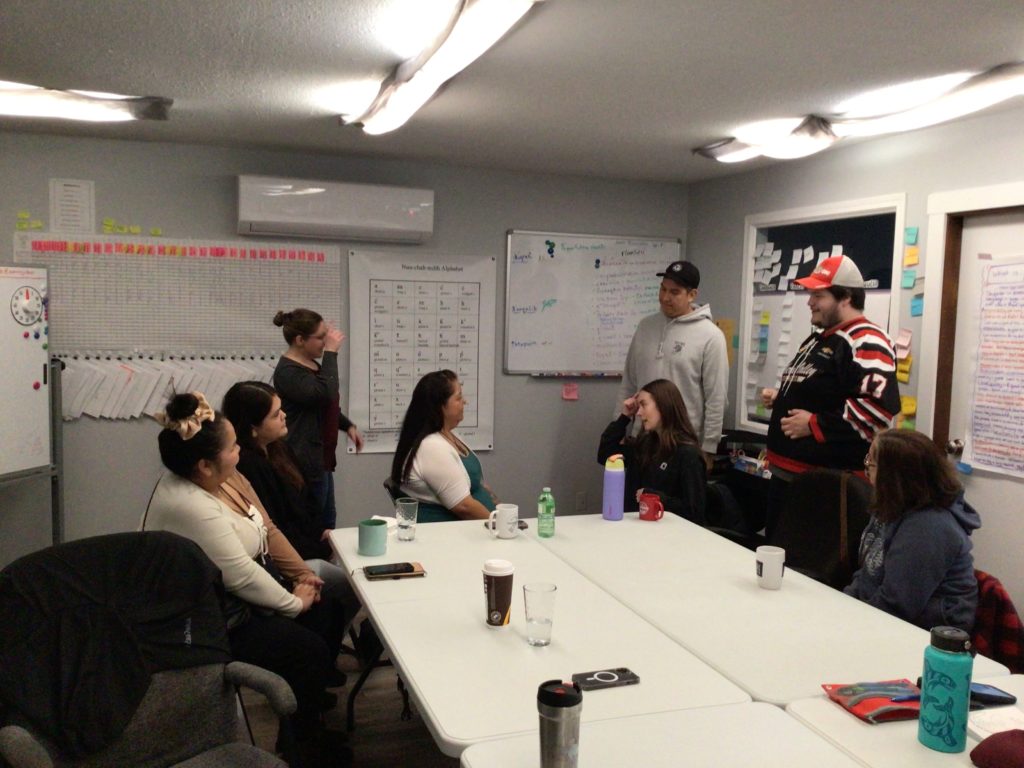
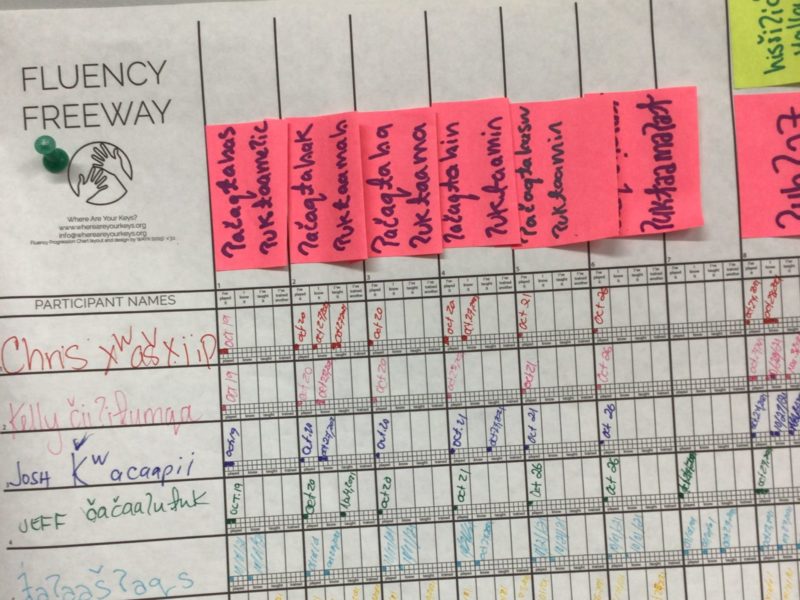
Mastering another language requires dedication and time and is achieved with a high level of commitment and personal accountability from learners. Learning our indigenous language presents unique opportunities. Unlike widely spoken languages like French or Spanish, where immersion and abundant resources are readily available, there are few fluent speakers of our indigenous language. As a result, we need to create opportunities and resources to work diligently as individuals to make progress toward proficiency.
Our language differs from English, with unique sounds and a very different grammatical structure. It is important to understand that the journey to advanced proficiency is a long-term commitment and fluency is a lifelong goal.
To reach intermediate proficiency it takes approximately 1000 intensive immersion hours along with deliberate practice. To become an advanced proficient speaker, it will take approximately 2000+ intensive immersion hours of the same deliberate effort. *
Learning a language or anything new as an adult can be uncomfortable, but helping to strengthen the language of this land and becoming a speaker and teacher is tremendously fulfilling, empowering, and connecting.
Due to the status of our language (see Language Strategy), our program strategically focuses on creating speakers and teachers among young adults. We must be strategic to have more people who will use the language in their homes with their children, teach others, and help to run and develop programs and resources.
*Johnson, Michele K. (Michele Kay), 1967-. (2013). n’łəqwcin (clear speech) : 1,000 hours to mid-intermediate N’syilxcn proficiency (Indigenous language, Syilx, Okanagan-Colville, n’qilxwcn, Interior Salish) (T). University of British Columbia. Retrieved from https://open.library.ubc.ca/collections/ubctheses/24/items/1
Details about our program:
The program is a part-time commitment that spans over two years, with classes scheduled for Tuesday from 9:00 am to 1:00 pm, and Wednesday and Thursday from 9:00 am to 12:00 pm.
We use the Where Are Your Keys teaching methods (https://whereareyourkeys.org) which focus on conversational language using sign language without relying on reading, writing, or translations. Students are expected to learn and teach language through immersion using WAYK techniques to achieve conversational language abilities. Over the course of two years, participants will accumulate approximately 600 classroom hours and 300 immersion hours.
While our program provides a strong foundation for conversational skills, students will need to dedicate additional time outside of class incorporating language into their daily lives to achieve proficiency in our language.
It is important to note that while our goal is to engage in immersion activities and develop an immersive curriculum, this program does not offer a complete immersion experience. However, we will gradually move towards immersion throughout the program, and it is the collective responsibility of all participants to support and sustain immersion during these times by trying to converse in the language and assisting others to do the same.
Our curriculum is a “living curriculum”. Edits will be made consistently throughout the program and lessons will be adjusted constantly. Our goal is to find the most effective pathway to language acquisition and that will require trial and error from our entire team. Please note that there are several different ways to say things in our language. What we are teaching is not the only way so be open to learning from others, especially fluent speakers outside of this program.
If you are interested in being a part of our program watch for A Call for Applications posted July of each year on “Tseshaht Language” Facebook page. To apply is a two-part process submit an online application form and then successful applicants will be contacted for an online interview. See more below.
Our approach to language revitalization is long-term, aiming to create a multi-generational impact. We believe that language revitalization is a lifestyle, and our focus is on cultivating lasting relationships that span decades. Together, we are committed to supporting and motivating all participants on their lifelong learning journey.
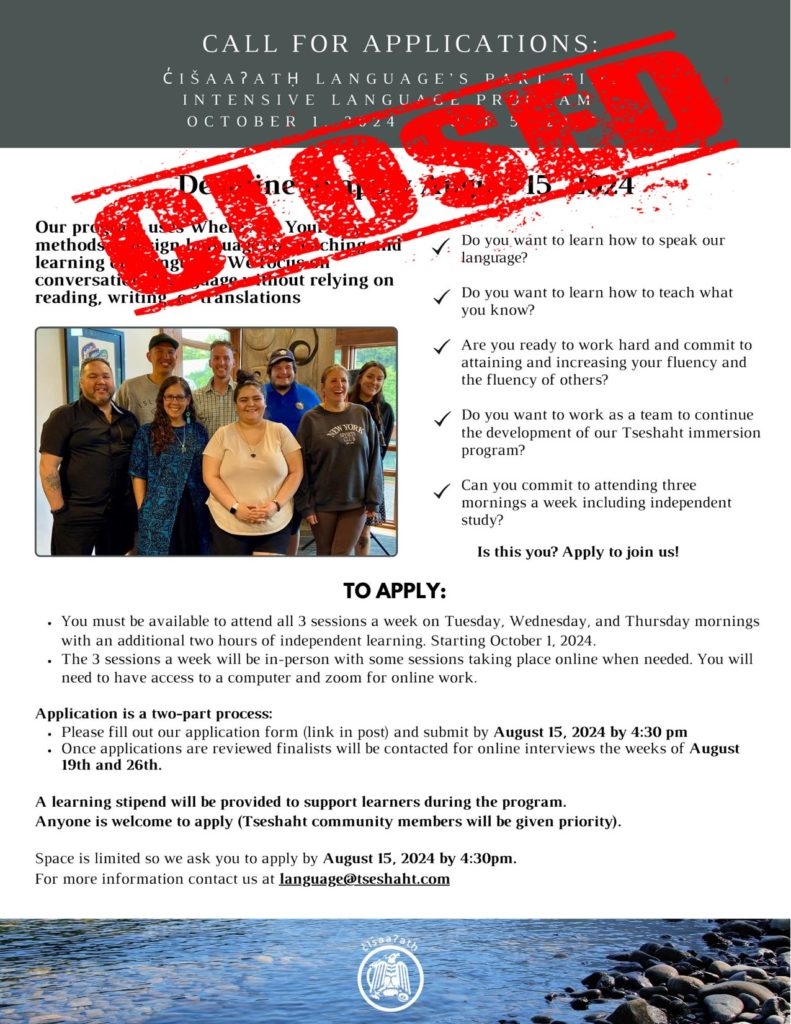
Testimonial from students

n̓an̓aaswiiʔas, Darci Doiron, completed year one (2024)
Things that worked well for me in the program:
The check ins and check outs helped establish a sense of community which cultivated a safe supportive environment to learn, encouragement from the team to fail fast and try new things, and to not be embarrassed to get things wrong. This was demonstrated by the other years of the program trying out new things in front of us. I felt more confident to do the same watching some of the previous year’s participants figuring things out (lunatic fringing on the year 3’s hunts and lists).
Advice on how to be successful in the program:
Come in with an open mind and forget what you know about other methods of learning. This methodology is different, but it really works. Working on language can feel like a challenge at times, but with the group we are learning with, there is a sense of humour and lightness that makes it feel easeful to learn.
Insight for future applicants:
Personal accountability is huge with this language journey, you’re going to get out of it what you’re willing to put in. Your own openness and willingness to learn contributes to the development of the program for both previous years and future language learners. The commitment to continue language outside of class, in our homes, within our community, is what will really keep growing the program and revitalizing our language.
